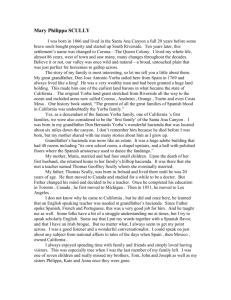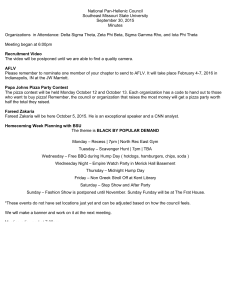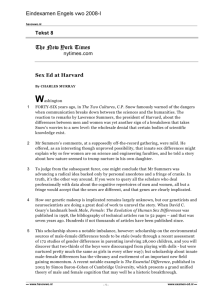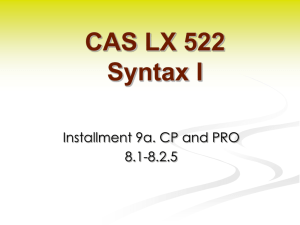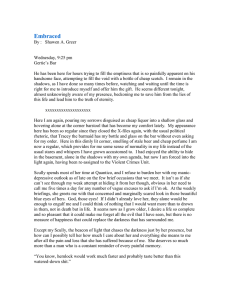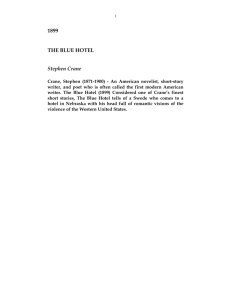The divine right to abuse other species
advertisement
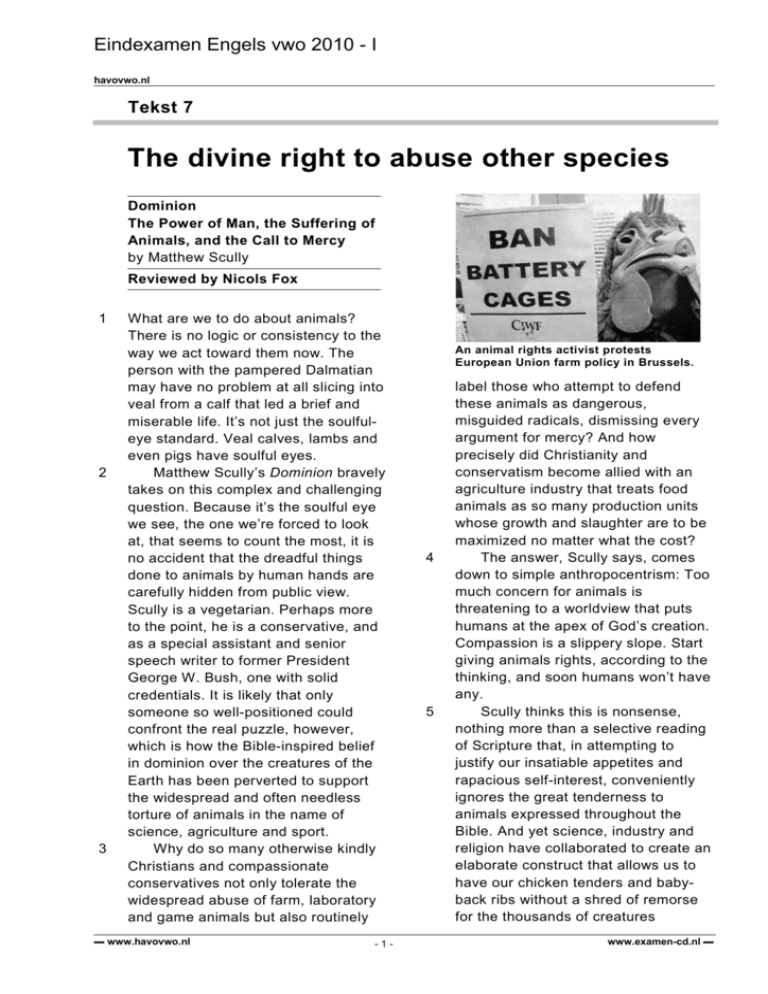
Eindexamen Engels vwo 2010 - I havovwo.nl Tekst 7 The divine right to abuse other species Dominion The Power of Man, the Suffering of Animals, and the Call to Mercy by Matthew Scully Reviewed by Nicols Fox 1 2 3 What are we to do about animals? There is no logic or consistency to the way we act toward them now. The person with the pampered Dalmatian may have no problem at all slicing into veal from a calf that led a brief and miserable life. It’s not just the soulfuleye standard. Veal calves, lambs and even pigs have soulful eyes. Matthew Scully’s Dominion bravely takes on this complex and challenging question. Because it’s the soulful eye we see, the one we’re forced to look at, that seems to count the most, it is no accident that the dreadful things done to animals by human hands are carefully hidden from public view. Scully is a vegetarian. Perhaps more to the point, he is a conservative, and as a special assistant and senior speech writer to former President George W. Bush, one with solid credentials. It is likely that only someone so well-positioned could confront the real puzzle, however, which is how the Bible-inspired belief in dominion over the creatures of the Earth has been perverted to support the widespread and often needless torture of animals in the name of science, agriculture and sport. Why do so many otherwise kindly Christians and compassionate conservatives not only tolerate the widespread abuse of farm, laboratory and game animals but also routinely ▬ www.havovwo.nl -1- An animal rights activist protests European Union farm policy in Brussels. 4 5 label those who attempt to defend these animals as dangerous, misguided radicals, dismissing every argument for mercy? And how precisely did Christianity and conservatism become allied with an agriculture industry that treats food animals as so many production units whose growth and slaughter are to be maximized no matter what the cost? The answer, Scully says, comes down to simple anthropocentrism: Too much concern for animals is threatening to a worldview that puts humans at the apex of God’s creation. Compassion is a slippery slope. Start giving animals rights, according to the thinking, and soon humans won’t have any. Scully thinks this is nonsense, nothing more than a selective reading of Scripture that, in attempting to justify our insatiable appetites and rapacious self-interest, conveniently ignores the great tenderness to animals expressed throughout the Bible. And yet science, industry and religion have collaborated to create an elaborate construct that allows us to have our chicken tenders and babyback ribs without a shred of remorse for the thousands of creatures www.examen-cd.nl ▬ Eindexamen Engels vwo 2010 - I havovwo.nl 6 7 subjected to unspeakable brutality before their short lives end in the bloody agony of slaughter. Animals, according to the behaviorist view, have no consciousness: They have no thoughts or emotions, and thus cannot really suffer in any human sense of the word. More nonsense, says Scully, who finds other science to support what any pet owner or horse breeder knows without question – that animals do indeed think and feel. 35 , the Cartesian view of animals as nothing more than machines has led to the dehumanization of all life. It’s a mindset that allows science to cheerfully anticipate growing human replacement parts in animal “volunteers,” rearranging bits and pieces of various species to create whatever creatures can be envisioned, and cloning anything that moves. A little closer reading of the Bible, Scully suggests, might identify this as hubris of the worst sort. In his reportorial mode, Scully takes the reader to a meeting of the International Whaling Commission, where Japan and Norway argue for the right to go after what remains of these massive sea mammals, then tours a hog-rearing facility where anxious, tightly-penned, unhealthy-looking sows give birth to hormone-enhanced litters. It’s all unpalatable. But it’s the philosophical justifications for these endeavors that occupy Scully most fully. Challenging the daunting coalition of science, religion and commerce, he skilfully refutes almost every argument that allows the misery and suffering of animals to be tolerated. 8 9 Scully has written what is surely destined to be a classic defense of mercy. A master of language, he leaves a memorable phrase on virtually every page. Yet our relationship to animals remains trickier than he acknowledges. Caring for God’s creatures can go just so far before it becomes fanaticism. Members of India’s Hindu Jain sect sweep the street as they go along to avoid stepping on an insect. Surely raising mice simply for experimentation is a perversion of stewardship, and yet setting a trap for a mouse in the pantry is a reasonable thing to do. Scully argues that there is a kind of natural moral governor that tells us what is acceptable if we will only pay attention. Reasonable lines must be drawn. But it won’t be simple. Scully seems to imply that every bite of meat must be accompanied by guilt. In today’s world of factory farming, he’s probably right. Humanely reared and slaughtered farm animals are scarce. Yet the conservative Scully fails to acknowledge that the appalling conditions on today’s industrialized farms are the inevitable result of a national cheap-food policy, one abetted by a global marketplace that insists on absolute efficiency in food production. When the consumer is driven by the same economic incentive, never questioning 38 , factory farms thrive. A workable economic system that allows for the incorporation of other values may be as challenging to devise as it will be to implement – which means that more remains to be written on this subject. Let’s hope that Scully will oblige. The Washington Post ▬ www.havovwo.nl -2- www.examen-cd.nl ▬ Eindexamen Engels vwo 2010 - I havovwo.nl Tekst 7 The divine right to abuse other species 1p 30 What is meant by “the soulful-eye standard” (paragraph 1)? A The amount of suffering visible in the eyes of animals. B The degree to which pain inflicted on animals is still acceptable. C The degree to which people feel loyalty to their pets. D The extent to which animals evoke compassion. 1p 31 Which of the following is the “puzzle” (paragraph 2)? A How mankind’s view of its own superiority has led to the justification of animal abuse. B How people are able to ignore animal abuse while it takes place all around them. C Why it is that science, agriculture and sport have been the determining factors in the treatment of animals. D Why so many people eat meat from animals reared and slaughtered under abominable circumstances. 1p 32 What do the questions in paragraph 3 focus on? A The connection between normally charitably-minded people and the misery they inflict on animals. B The need for all rationally-minded people to close ranks against the merciless industrial treatment of animals. C The threat that animal activists pose to the vested interests of the more conservative part of society. 1p 33 Which of the following reflects the “answer” (paragraph 4)? A A more humane treatment of animals could mean less attention for human misery. B From the human perspective, animals are by definition of lesser importance than humans. C It is simply not possible to feel the same compassion for animals as for humans. 1p 34 Which of the following explains the use of “And yet” (paragraph 5)? Scully is of the opinion that A the Bible is read selectively. B the Bible preaches respect for animals. C the meat industry treats animals brutally. ▬ www.havovwo.nl -3- www.examen-cd.nl ▬ Eindexamen Engels vwo 2010 - I havovwo.nl 1p 35 Which of the following fits the gap in paragraph 6? A Ironically B Similarly C Surprisingly D Unfortunately 1p 36 Which of the following agrees with the reviewer’s opinion as expressed in paragraph 8? A Scully does not clearly outline the distinctions one needs to make in the treatment of animals. B Scully is arbitrary in his selection of animals that should be treated with respect and decency. C Scully’s recommendations might make life unnecessarily complicated. D Scully’s view opens the door for animal rights extremists. 1p 37 Which of the following can be concluded from “Scully seems … food production.” (paragraph 9, first half)? A As long as factory farming exists, the consumer will buy meat. B People are prepared to pay more for meat from animals reared and slaughtered in a humane way. C Scully does not address the politics sanctioning animal abuse. D Scully should advocate a decent food policy for the US market before tackling the global market. 1p 38 Which of the following fits the gap in paragraph 9? A the monopoly of factory farms B the origins of the meat they eat C what makes cheap meat possible D whether people should eat meat at all ▬ www.havovwo.nl -4- www.examen-cd.nl ▬

